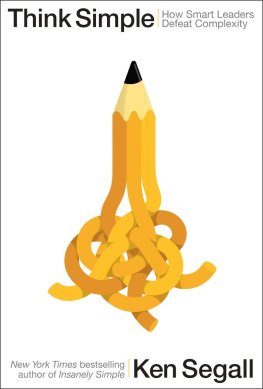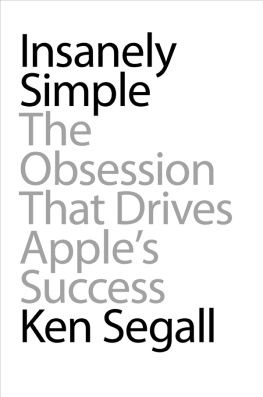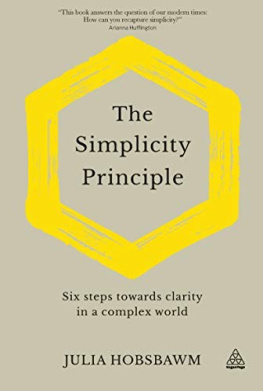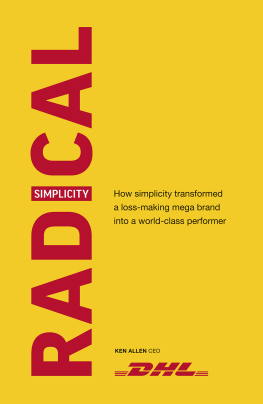Copyright 2016 by Polymorph on Hudson, Inc.
Penguin supports copyright. Copyright fuels creativity, encourages diverse voices, promotes free speech, and creates a vibrant culture. Thank you for buying an authorized edition of this book and for complying with copyright laws by not reproducing, scanning, or distributing any part of it in any form without permission. You are supporting writers and allowing Penguin to continue to publish books for every reader.
Names: Segall, Ken, author.
Title: Think simple : how smart leaders defeat complexity / Ken Segall.
Identifiers: LCCN 2016017400 | ISBN 9781591847502 (hardback) | ISBN 9780698180864 (e-book)
Subjects: LCSH: Management. | Simplicity. | Organization effectiveness. | Leadership. | BISAC: BUSINESS & ECONOMICS / Marketing / General. | BUSINESS & ECONOMICS / Management. | BUSINESS & ECONOMICS / Organizational Development.
Classification: LCC HD31 .S3668 2016 | DDC 658.4/092dc23 LC record available at https://lccn.loc.gov/2016017400
I swear. Had to write a book first.
Introduction
Simplicity Isnt Simple
Simplicity is one of the most deceptive concepts on earth.
Its arguably the most potent weapon in businessattracting customers, motivating employees, outthinking competitors, and creating new efficiencies. Yet rarely is it as simple as it looks.
Simplicity takes work.
But, as more and more companies around the world are discovering, the ROI on simplicity can be astonishingly high. Simplicity can power a company to amazing growth or revive a company thats become mired in complexity.
While clients and customers see simplicity as an end result, the reality is that its so much more. Its a philosophy and a methodology, and it can be implemented at every level of an organization. It can transform a company internally and change the way its perceived by others.
I often feel like I have the easiest job on earth. Its not like I have to convince the world that simplicity is a good thing. We all know that. Obviously, customers are attracted to companies that offer simpler solutions. Employees are more motivated when the work environment is less complex, and prospects respond best to communications that register quickly and clearly.
These things are a given. The challenge is this: How exactly does a company make the journey from here to simplicity? Thats what this book is all about.
Becoming an Agent of Simplicity
Its no wonder complexity has become so entrenched in this world. Its had a few thousand years to dig in. One could say that complexity is actually a side effect of civilization.
The more we discover, the more we invent, the more we advance, the more complicated life becomes. Which is ironic, given that so many innovations are meant to simplify.
It would be convenient to blame the current state of the worlds complexity on technology, but we have to face the facts. The real culprit is us. Were human. Its in our DNA to prefer simpler things, yet we so often open the door to complexity.
Thats because being complicated is easy. Making things simpler is the more challenging task, and one that is often neglected. Nowhere is this more true than in the world of business.
As our companies grow, we dream up new ways to manage, organize, communicate, and compete. We do it all with the best of intentions, but things get complicated along the way. Internal structures grow more complex. Product lines expand. Processes proliferate. Levels of hierarchy multiply. People start defending their turf. Meetings begin to consume our days.
We do it all in the name of achieving consistent, repeatable success, but we pay the price by sacrificing simplicity. Business just isnt as frictionless as it once was. That beautiful focus present at a companys inception becomes nothing more than a plaque on the wall or a dedication in a fifty-page employee manual.
If the signs of complexity are present in your business, youre not alone. In fact, youre among the vast majority of companies in this world. The good news is, where there is complexity, there is also opportunity.
You can become an agent of simplicity. You can put your company on a course to undo the complexity that has taken root over time. Or, if your company is currently enjoying the fruits of simplicity, you can help lay the groundwork to ensure that it can resist the forces of complexity that will inevitably appear.
My previous book, Insanely Simple, was based on observations gained from twelve years working as Steve Jobss advertising agency creative director, first with NeXT and then with Apple. I saw firsthand that Steve looked at everything through the lens of simplicity. His obsession with simplicity was not only visible in Apples products, but you could see it in the way the company organized, innovated, advertised, sold at retail, and provided customer service.
In practice, simplicity was Steves most powerful business weapon. It helped Apple distinguish its products and create entirely new product categories, and it put distance between Apple and its competitors. But, while Apple is a terrific example of a company that has been propelled by the power of simplicity, it is hardly alone.
Heroes of Simplicity
Inspired by the ways Apple has benefited from the power of simplicity, I set out to find other companies that were traveling this path. I wanted to learn more about the thinking of their leaders. I felt that if I could chronicle the experiences of those who have successfully simplified, it would be an invaluable guide for those who would like to do the same.
This book is the result of my journey into simplicity in companies around the world.
Over the course of three years, I searched for the smartest, most inventive spokespeople for simplicity that I could find. I landed some of my interviews the old-fashioned way: I begged. I also picked the brains of former colleagues and clients and latched onto a terrific researcher who provided a treasure chest of possibilities.
I will not hide the fact that I had a blast doing the research. I felt privileged to meet a number of leaders I have long admired and to have my eyes opened in unexpected ways by the leaders of some truly fascinating companies.
Many of the heroes of simplicity profiled in this book wouldnt be found on your list of usual suspects. By the time Id finished my research, Id had conversations with over forty men and women from a wide range of industries in many countries. Id talked to leaders from companies big and small, established and up-and-coming, famous and under the radar. Id looked at businesses local, national, and international.
Each leader has a fascinating point of view about how simplicity has helped improve his or her company and set it apart from competitors. Each is unique, yet, as youll find, many display interesting similarities.
From Jerry Greenfield youll hear how Ben & Jerrys grew from local to global without losing its focus and simple values. From the CEO of one of Australias biggest banks youll hear how simplicity is attracting new customers. From former Apple senior VP Ron Johnson youll hear how a simple idea aligned the team creating the worldwide network of Apple Stores.











